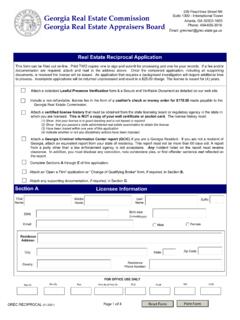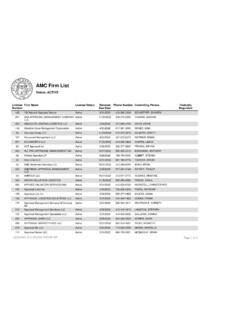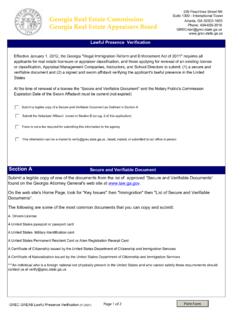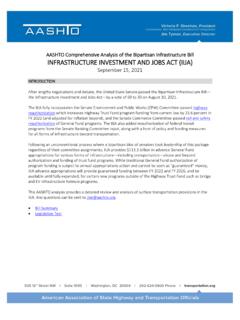Transcription of Real Estate Education Manual - grec.state.ga.us
1 REAL Estate Education IN GEORGIA GEORGIA REAL Estate COMMISSION GEORGIA REAL Estate APPRAISERS BOARD PRODUCED BY GEORGIA REAL Estate EDUCATORS ASSOCIATION UNDER A GRANT FROM THE REAL Estate Education , RESEARCH AND RECOVERY FUND RIC WILSON, MA EDITOR A PUBLICATION OF THE GEORGIA REAL Estate COMMISSION ALL RIGHTS RESERVED THIRD EDITION, 2012 ACKNOWLEDGEMENTS The Editor gratefully acknowledges and thanks the following individuals for their valuable contributions to the production of this Manual : Rebecca Fletcher, Executive Vice President for Education of the Atlanta Board of Realtors and Director of the Georgia Institute of Real Estate for coordinating the project; real Estate educators Greg Dunn, Amy Asher, and Wade Gaddy for reading the manuscript and making valuable corrections and additions to the content. Georgia Real Estate Commission Real Estate Education in Georgia TABLE OF CONTENTS Chapter 1 REAL Estate SCHOOLS Section A: Obtaining Approval as a Real Estate school 1A1 Definition of an Approved Real Estate school 1A2 Minimum Standards for an Approved school 1A3 Application for school Approval 1A4 school Name, Location and Contact Information 1A5 school Director and/or Coordinator 1A6 Maintenance of Course and Student Records 1A7 Nonpublic Postsecondary Educational Institutions Act of 1990 1A8 Directors and Owners of the Approved school 1A9 Attendance Standards and Make-up Policy 1A10 Entrance Qualifications for Students 1A11 Commission Required Materials 1A12 Learning Environment 1A13 Electronic Registration and Communication 1A14 Compliance with the ADA and Policies Against Unlawful Discrimination 1A15 Course Information 1A16 Course Materials 1A17 Evaluating Student Performance 1A18 Learning Objectives 1A19 Instructors 1A20 Planned Course Offerings 1A21 Independent Study (Computer-based)
2 Courses 1A22 Criminal History Report Section B: Additional Information and Requirements 1B1 Tuition and Fees 1B2 Notice to Students 1B3 Preliminary Decisions for Persons with Criminal Convictions or Sanctions 1B4 Recruiting Prelicense Students to Join a Particular Brokerage Firm 1B5 Evaluating Instructors 1B6 Maintenance of Records 1B7 Courses Held at Locations Other Than the school s Address 1B8 Advertising 1B9 Reporting Changes 1B10 Communication with Approved Schools Via the Internet 1B11 Meetings and Conferences Chapter 2 REAL Estate COURSES Section A: Offering Approved Courses 2A1 Establishing Approved Courses 2A2 Obtaining a Course Code for Each Course 2A3 Course Outline and Learning Objectives 2A4 Instructors 2A5 Text Materials and Audio/video Recordings 2A6 Record Keeping 2A7 Hours of Instruction 2A8 Homework Assignments, Student Study, and Instructional Techniques 2A9 Teaching Ethics in Real Estate Courses 2A10 Advertising 2A11 Using the Name of the Commission in Advertising 2A12 Offering Approved Courses with Any Entity that Is Not Approved as a school or at a Location other than the school s Address 2A13 Advertising Examination Passing Percentages 2A14 Changes and Exceptions 2A15 Offering Cram Courses and other Non-Approved Courses Section B.
3 Prelicense Courses 2B1 Required In-Class Hours 2B2 Community Association Managers Prelicense Course Curriculum 2B3 Salespersons Prelicense Course Curriculum 2 B4 Brokers Prelicense Course Curriculum Section C: Postlicense and Continuing Education Courses 2C1 Salespersons Postlicense Course 2C2 Continuing Education Courses 2C3 Reporting Student Completion of Courses Section D: Common Requirements for Postlicense Courses and Continuing Education Courses 2D1 Units of Instruction That Are Not Among the Prescribed Curricula for Prelicense Courses 2D2 Common Requirements: Maintaining Course Outlines and Learning Objectives 2D3 Common Requirements: Texts 2D4 Common Requirements: Hours of Instruction 2D5 Common Requirements: Instructors and Instructional Techniques 2D6 Common Requirements: Notice to Students 2D7 Common Requirements: Attendance Monitoring and Makeup Policy 2D8 Common Requirements: Homework, Student Certification, Graded Examinations 2D9 Common Requirements: Records Maintenance 2D10 The State Examination Process Section E: Distance Education and Computer Based Courses 2E1 In-class Courses Offered Simultaneously at Numerous Sites 2E2 Rebroadcast or Replays of Recorded Courses 2E3 Approval of Computer-Based Courses 2E4 ARELLO 2E5 Standards for Computer-Based Courses 2E6 Required Testing and Evaluation of Courses 2E7 Types of Courses that Do Not Meet the Requirements for Approval 2E8 Unique Requirements for Prelicense and Continuing Education Courses 2E9 Instructors for Computer Based Courses Section F: Alternatives for Meeting Prelicense and Continuing Education Requirements 2F1 Alternatives for Meeting Prelicense Course Requirements 2F2 Alternatives for Meeting Continuing Education Requirements 2F3 Verification of Course Completion Chapter 3 REAL Estate COURSE INSTRUCTORS Section A.
4 Prelicense Course Instructors 3A1 Instructor Application Requirements 3B2 Renewal of Instructor Approval Section B: Continuing Education and Postlicense Instructors Section C: Guest Instructors Chapter 1 REAL Estate SCHOOLS The Georgia Real Estate Commission (GREC) approves schools to offer real Estate course credits to licensees and prospective licensees for meeting the educational qualifications for licensure and to meet requirements for postlicense Education and continuing Education . school approval is based upon requirements outlined in the Rules of the Georgia Real Estate Commission, Chapter 520-2 Standards for Real Courses (Section ). Only an entity that obtains specific approval by the GREC as a real Estate school may offer courses that licensees and prospective licensees may use to meet prelicense, postlicense or continuing Education requirements. The goal of this Chapter is to assist organizations and individual entities in understanding and satisfying the requirements for becoming a GREC Approved Real Estate school .
5 The Application to Open a Real Estate school is available on the Commission s website at this location: Section A. OBTAINING APPROVAL AS A REAL Estate school 1A1 Definition of an Approved Real Estate school A real Estate school may be an existing or prospective educational institution; a real Estate company; a professional association, a mortgage company; the continuing Education department of a university, a college or a technical school ; a business specializing in real Estate -related services such as home inspection, pest control, or energy services; or an individual. In each case, before the school can offer even one course that qualifies as meeting Commission requirements, the GREC must approve the organization or person based upon a review of the information contained in an initial application. 1A2 Minimum Standards for an Approved school The Commission has established minimum standards that real Estate schools must follow in offering courses in order to protect the interest of the public and the real Estate industry from unscrupulous practices in Education .
6 These standards define how schools approved by GREC must operate. However, these are minimum standards. A school will often discover that the public and real Estate licensees require and demand standards that exceed those established by the Commission. A school may find, for example, that its requirements for completing a course need to include more hours, more homework, more examinations, and tougher standards of completion for students than the GREC requires. Although no school may offer courses in a way that is contrary to GREC regulations without the written permission of the Commission, the GREC encourages schools and instructors to be innovative in their approach to educating students in real Estate courses. 1A3 Application for school Approval Commission Rule outlines the requirements for the approval of real Estate schools. To 1 be considered for approval, the organization or individual must file an application with the GREC.
7 The Commission may choose not to process an incomplete application that fails to include all required information or that is not accompanied by a cashiers check or money order for the required fee. All complete applications accompanied by the required fee will be processed within sixty (60) days, and the GREC will notify the applicant that its application is approved or denied or will request additional data or revisions of the application. If the Commission requests additional information or revision of the application, the school applicant must respond within 120 days or the application will be considered abandoned. Upon approval, the school will receive a unique number as the school Code. The school Code identifies the particular school and must be used on all records certifying students as having completed courses, on school renewal applications, and other communications between the school and the Commission.
8 The GREC approves schools for a four-year period. A school renews its approval by December 31st of the fourth year following the year of approval. For example, a school approved by the Commission on November 1, 2009, would renew its approval no later than December 31, 2013. Schools may renew their approval on-line at the GREC website ; by mail at Georgia Real Estate Commission, 229 Peachtree Street, , International Tower, Suite 1000, Atlanta, Georgia 30303-1605 or by visiting the GREC offices at that location. The following Sections (1A4 1A22 of this Chapter) are intended to assist applicants in completing the Application to Open an Approved school . 1A4 school Name, Location and Contact Information The applicant must designate on the application a name for the school , its location address, mailing address, phone and fax numbers, e-mail address, and website address as appropriate.
9 1A5 school Director and/or Coordinator Every real Estate school must designate a school director and/or coordinator who will be responsible for certifying student completion of all courses. A school may name any person in the organization as the school director or school coordinator. The Commission will then address all correspondence to the person named as school director. If the organization names an officer or owner as the school director and that person does not have hands on management of the school on a daily basis, the GREC recommends that the organization name a school coordinator who will manage course registrations, communication with students, and correspondence with the Commission. As an alternative, the school may name one person as both the school coordinator and the school director. Upon a school s approval, the Commission authorizes the school director and school coordinator named on the application to sign any documents or correspondence required by the Commission.
10 The GREC also requires the school to authorize 2 the school director with legal authority to commit the school to any future disciplinary sanctions the Commission might impose. Consistent with Georgia Law, the application requires that an applicant provide the names and social security numbers of the school director and the coordinator. In addition the school must reveal on the application any convictions or disciplinary actions imposed upon the school s director or coordinator, owners, officers, stockholders, or instructors by any state or federal agency that regulates professions. GREC Rules require that a school immediately report to the Commission in writing any changes in its director, coordinator, name, phone number, location, or mailing address. Effective January 1, 2012, the Georgia "Illegal Immigration Reform and Enforcement Act of 2011" requires all applicants for real Estate licensure and those applying for renewal of an existing license, Instructors, and school Directors to submit: (1) a secure and verifiable document and (2) a signed and sworn affidavit verifying the applicant's lawful presence in the United States.














